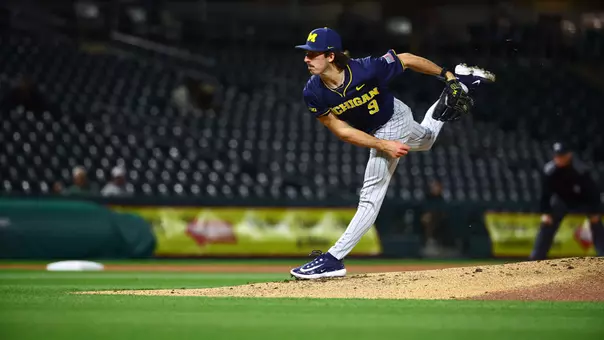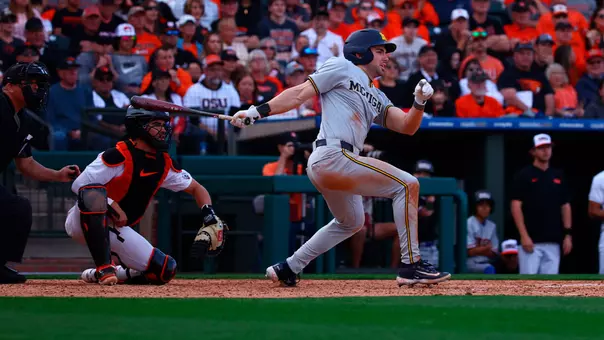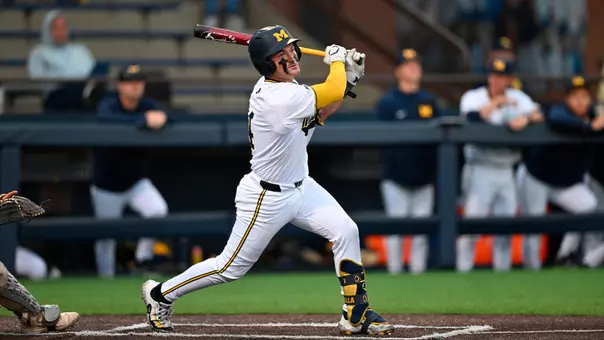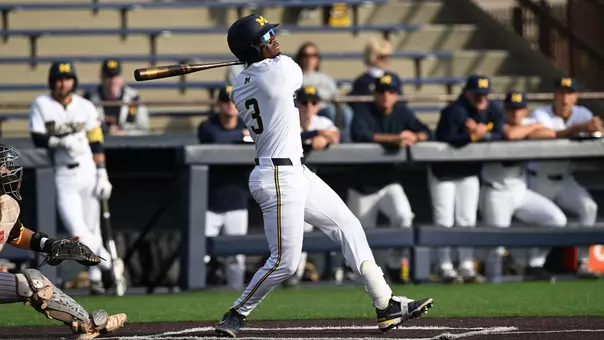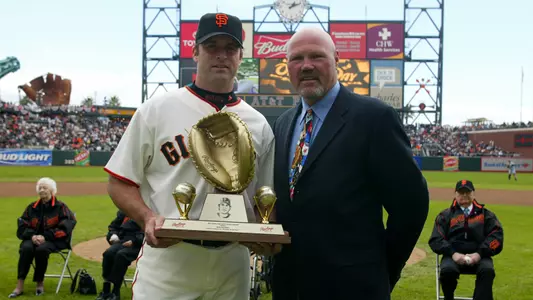
Matheny, Nearing 600th Win, Recalls Freehan Shaping Playing, Managerial Careers
8/3/2020 11:30:00 AM | Baseball, Features
By Steve Kornacki
DETROIT, Mich. -- Mike Matheny has pretty much done it all.
The University of Michigan's 1991 baseball team MVP and co-captain played 13 seasons in the major leagues, earning four Gold Gloves and setting the record for catchers with 252 consecutive errorless games. He threw out 49 would-be base stealers to lead all catchers in 2000 and started in the 2004 World Series.
Matheny became the first manager in the majors to lead his first four teams to the playoffs, and got the St. Louis Cardinals to the 2013 World Series before losing a tense, six-game series to the Boston Red Sox. The lessons learned from top managers such as Tony La Russa and Phil Garner paid off quickly for a baseball lifer who never coached or managed in the minors.
He met his wife, Kristin, in a class at Michigan on the day he decided against signing with the Toronto Blue Jays, who drafted him out of high school. They had five children, each of whom has played college and/or pro sports, and have three grandchildren. He wrote a New York Times best-seller, "The Matheny Manifesto," with Jerry B. Jenkins. "It's about youth sports and what we can do better," noted Matheny.
And this spring, as the new manager of the Kansas City Royals, he survived a painful bout with COVID-19 while on the verge of his 600th managerial victory.
That's a lot in 49 years, and not bad for a guy who arrived in Ann Arbor as a freshman under Coach Bud Middaugh to find himself one of nine catchers in the program.
Matheny won the Ted Sizemore Award as Michigan's best defensive player as a freshman in 1989, but said he blossomed the next two seasons under new coach Bill Freehan -- the Wolverine football and baseball star who was an 11-time All-Star and won five Gold Gloves with the Detroit Tigers.
Freehan came to San Francisco in 2006, when the Giants presented Matheny with his final Gold Glove. The student treasured that gesture from his mentor, who went to great lengths to develop him in every way.
"Coach Freehan gave me a master's course in catching," Matheny told MGoBlue.com last week, when the Royals visited Detroit. "And not just with the mechanics, but more so the mentality. He gave me the opportunity to learn how to run a pitching staff. Bud called every pitch from the dugout my freshman year, like a lot of coaches do.
"But in our first intrasquad game that fall, Bill stopped practice and flat-out screamed at me when I looked into the dugout for his call. He said, 'You're the catcher! You're in charge. You can see what's going on. You have a brain, you can think. Call this game.' I've used that with literally thousands of youth coaches. If ever anyone had the resume to call the game for a kid, it was Bill Freehan. But he also knew how to teach me how to do it. I tell coaches, 'Give your catchers the "why" and teach them.'
"When I called games, my pitching coach, Dave Duncan, who was a great one (with St. Louis and other teams), would always want to know the 'why' behind calls. In my very first major league game in 1994 with Milwaukee, I was so excited about making the jump from Double-A, and when I came off the field after the first inning, Phil Garner stops me on the first step. He said, 'What's the second pitch you (called) to the second hitter?' I paused, and he said, 'Don't you ever walk off this field without a reason why you called a pitch.' So, I had some really good teachers in how to go about this position. But Bill Freehan was the one for me."
Yet, when I asked Matheny about the greatest impact Freehan had on him, it was something Freehan stressed academically.
"We'd just had an awards ceremony after my freshman year -- when we came one win away from going to the College World Series (and finished 49-16)," said Matheny. "We lost that game to Wichita State, which ended up winning it all. And I met Coach Freehan there, and I definitely knew who he was.
"Then I reported to campus that summer, and on the first day he brought me into his office. We talked a bit and he told me he had seen me catch. Coach Freehan said, 'OK, here's the deal. Every elective you have is going to be a Spanish class. I've watched you catch and believe you are going to catch in the minor leagues. And one day, you might even coach or manage.'
"That was pretty prophetic. I wasn't happy about it because I had some pretty easy electives lined up. That turned into pretty hard Spanish classes. I ended up taking over 20 hours of them. At the time, Michigan didn't have a minor in Spanish, but my academic advisors told me anything 20 hours or over could be considered a concentration. Which, obviously, in this baseball world, has been something that I use every single day. That was my introduction to Bill Freehan."
Matheny, an Academic All-Big Ten honoree in 1990, said that decision has become priceless in his ability to communicate with Spanish-speaking players.
"I use Spanish every day," said Matheny. "I've got a great vocabulary; I conjugate verbs well. Michigan taught me everything I needed to know, but conversational is different. I think the guys appreciate the fact I stumble through that some. It gives them empathy when they get a camera shoved in their faces to speak their second language. But the guys will correct me and give me words of the day in Spanish.
"I challenge them to speak our (English) language, and they challenge me to speak theirs."

Matheny as a Wolverine in 1990
Freehan also went out of his way to introduce Matheny to Tigers Hall of Famers Al Kaline, Jack Morris and Alan Trammell. Lou Whitaker, too.
"It was my sophomore or junior year and I was never a good offensive player in college," said Matheny, who batted .281 with seven homers, 15 doubles and 39 RBI in 52 games in 1991. "Coach Freehan was starting to see the opportunity I had to be a legitimate draft pick.
"He wanted to work on my hitting. He called my apartment and said, 'I need you at the cages. When's your last class?' I thought I was going to get a one-on-one day with Bill Freehan, pretty cool. So, I'm swinging in the cages to get loose and I see this gentleman walking towards me. I just about fell over. It's Al Kaline. I couldn't believe it. I wish I could tell you that I wrote down every word in a notebook, but I was so in awe that I had trouble focusing. I'm thinking, 'How does a superstar player take this much time to come down and work with a no-name, half-talented college guy?' He stood out as such a top-shelf individual. The guy he reminded me of once I got to know him was (Cardinals Hall of Famer) Stan Musial."
Matheny left after his junior season, when the Brewers drafted him in the eighth round, and he batted .239 with 67 homers and 443 RBI in the big leagues.
He had been wooed by Toronto general manager Pat Gillick (enshrined in Cooperstown in 2011) and assistant GM Gord Ash after they drafted him in the 31st round off his senior year at Reynoldsburg (Ohio) High.
"They followed me that summer and I had a good year," said Matheny. "I made the Junior U.S. Olympic team. They talked to me before I left for Ann Arbor and started getting serious. But it made no sense for me to go pro after getting drafted that low. Michigan was the school I'd dreamed of going to.
"The morning of my very first class, Gord Ash called and said, 'Before you go to that first class (then the cutoff for pro teams signing college freshmen), we want you to hear what we're offering.' They upped it to what second-round picks get. And it did cross my mind because that was my endgame. I wanted a Michigan education (he graduated with a degree in sports management and communications by coming back to complete 41 credit hours) but also knew that deep down, more than anything, I wanted to be a baseball player.
"So, I grudgingly walked away from that. I went to my first class, walking away from a significant signing bonus, walking away from my dream and wondering if it was the right decision. Thirty-some years later, I can tell you there was a blonde in the first row of that class who became my wife."
The oldest of their four sons, Tate, a fourth-round pick by the Red Sox in 2015, has reached Triple-A. Blaise, Luke and Jacob also have played college baseball.
"My daughter, Katie, played -- and you'll get a kick out of this -- four years and was the team captain of the (ice) hockey team at Ohio State," said Mike, who wasn't recruited by the nearby Buckeyes. "My wife was an athlete, and played field hockey at Michigan. Fortunately, our kids got her genetics."
The proud papa laughed.
However, they faced a great family challenge while quarantining with three of their children.
"My wife and I immediately took off to a lake house we have," said Matheny. "We'd been exposed and wanted to get away from everyone else -- especially the grandkids. Three days later, one of my sons tested positive and had all the symptoms. I got tested and had every symptom you can think of. A month and half later, then I tested positive for the antibody. It had been negative before.
"I got shut down (until fully recovered). We are fully quarantining as a team, going straight from the hotel to the stadium. At home, it's straight from home to the stadium and back. Nowhere in between. My wife, none of our other family, got it. We're still baffled about how she didn't get it."
Salvador Perez, his six-time All-Star and five-time Gold Glove catcher, was among his Royals players who tested positive for COVID-19.
"It helped me with Salvy, having had it," said Matheny. "I told him, 'You're going to get through it.' My reactions and symptoms weren't a lot of fun. They lasted a couple weeks. And hardly anything happened to my son."

Matheny was 591-474 (.555) and won four Central Division titles with St. Louis, 2012-18. The Cardinals let him go after a 47-46 start two years ago, and he became special advisor for player development to the Royals last year before replacing retired manager Ned Yost this season.
"I take something that I learn every day into the next day," said Matheny. "People want to see wholesale changes, but change is ever-evolving. I've made so many changes from my first year to my seventh year of managing. I surround myself with good baseball people who go about things for the right reasons.
"There are things I wanted to focus on after I was let go -- doing a better job interacting with the media, and I got my master's in organizational leadership at Colorado State Global all online. I'm also investing more time in analytics, and figuring out how to do that better. But in the time off, I realized how much I missed baseball."
He credited La Russa and Garner for the "hard-nosed style of baseball" they taught him as a player, and he served La Russa as an advisor between playing and managing.
"Tony continues to stay as a mentor to me," said Matheny. "He's stayed involved in my life. Like I said, it's not just about commodities. It's about people."
What's he proudest of from his career?
"It's always going to be about the people," said Matheny. "The game is 90 percent people and 10 percent baseball. It's the relationships. I always tell people, 'As much as I enjoyed the game from the field, I enjoy it more from this seat.' A lot of it is that I allow myself to enjoy it more. It's not about me, actually, it's about the people I serve as an encourager, as a teacher, as a coach. But also as a shield to protect them when things get in their way of being who they can be and having the kind of career they want.
"It's every kid's dream to get to the majors, and I see how important that is to our young players and their families and coaches who support them. They beat a whole lot of odds to get here. I'll never forget my first day in the majors or standing during the national anthem for the World Series at Fenway (Park) as a player and then as a manager on the biggest stage.
"It's what you dream of from the time you play Wiffle Ball in your backyard, and it's been some experience. It lived up to everything I ever wanted it to, grinding out 162 games and being on teams that get to the top, and winning pennants, getting the rings. I still haven't won a World Series, and that's what I'm motivated to do."
He gives thanks to many, including God, and often signs autographs with the Bible verse John 3:16: "For God so loved the world, that he gave his only begotten son, that whosoever believeth in him should not perish, but have everlasting life."
Matheny said, "I made that commitment a long time ago. The core of who I am is my faith, and I give them the power of that verse rather than just my name. I get feedback, and it's self-induced accountability.
"My walk better back up my talk, and I believe that the pictures are more important than the words in the book of my life."

